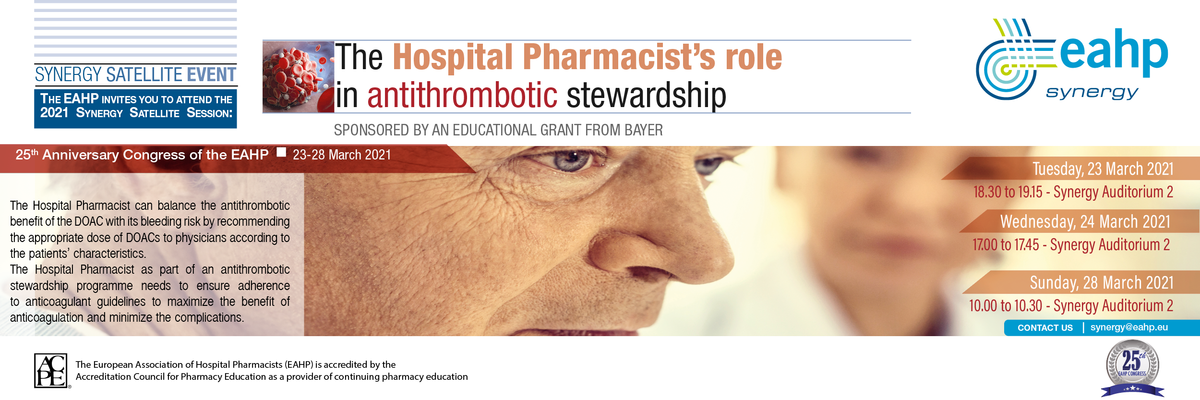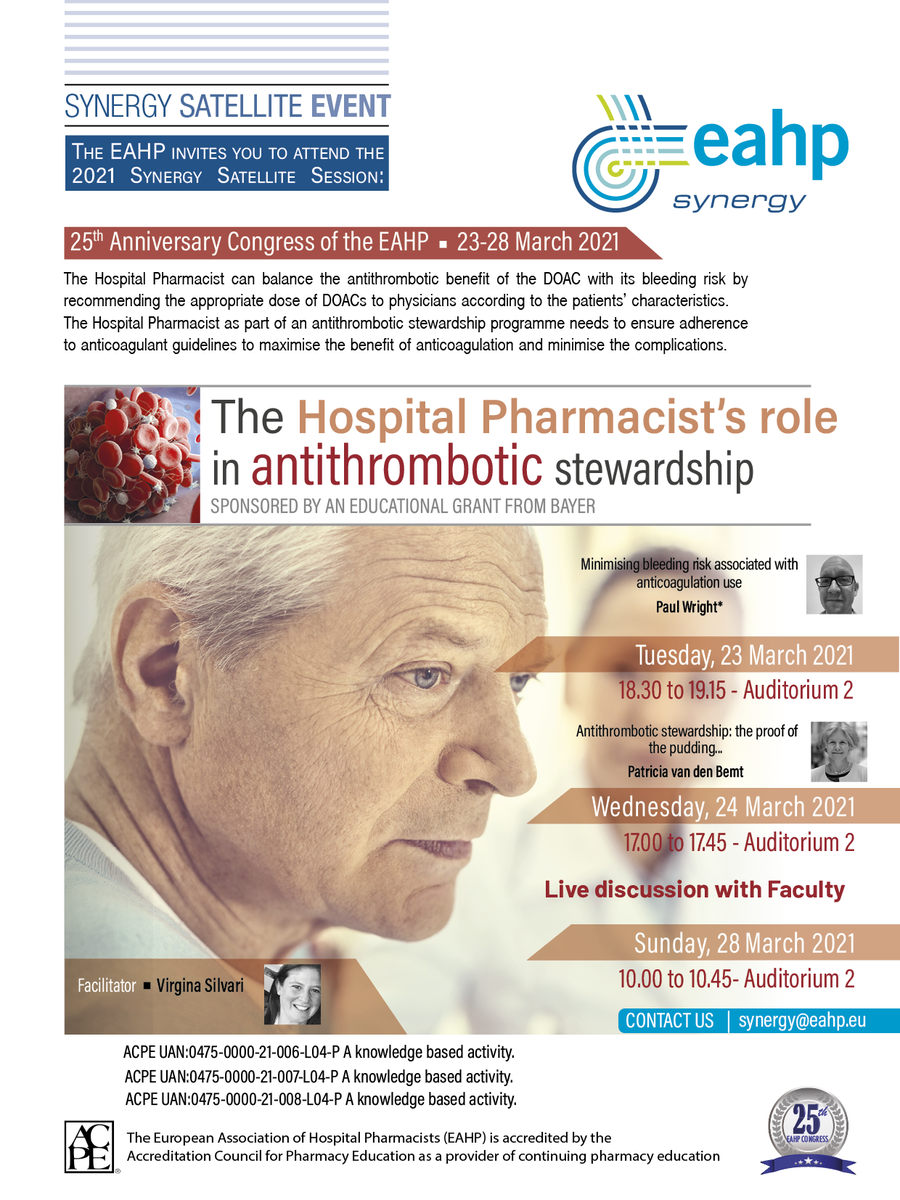Synergy Satellite Event – The Hospital Pharmacist’s role in antithrombotic stewardship (sponsored by an educational grant from Bayer)
Room:
Synergy Auditorium 2
Facilitator:
Silvari, Virginia
Speakers:
Abstract:

Linked to EAHP Statements
Section 1 – Introductory Statements and Governance: Statement 1.1
Section 2 – Selection, Procurement and Distribution: Statements 2.3, 2.7
Section 4 – Clinical Pharmacy Services: Statements 4.1, 4.2, 4.3, 4.4, 4.5
Section 5 – Patient Safety and Quality Assurance: Statements 5.1, 5.4, 5.5, 5.6
Agenda
– Tuesday, 23 March 2021: 18.30 – 19.15
Facilitator: Virginia Silvari
Presenter: Paul Wright
Topic: Minimising bleeding risk associated with anticoagulation use
Learning objectives of the session:
– List the reversible risk factors for bleeding in patients receiving a DOAC
– Determine the plans to reduce the risk of complications in patients receiving a DOAC by managing reversible risk factors for bleeding
ACPE UAN: 0475-0000-21-006-L04-P. A knowledge-based activity.
– Wednesday, 24 March 2021: 17.00 – 17.45
Facilitator: Virginia Silvari
Presenter: Patricia van den Bemt
Topic of the session: Antithrombotic stewardship: The proof of the pudding…
Learning objectives of the session:
– Explain how the establishment of an antithrombotic stewardship programme within the hospital can improve adherence to anticoagulant guidelines to maximize the benefit of anticoagulation and minimize the complications.
– Disseminate the knowledge gained to both their peers and other healthcare professionals in their hospital.
ACPE UAN: 0475-0000-21-007-L04-P. A knowledge-based activity.
– Sunday, 28 March 2021: 10.00 – 10.30
Facilitator: Virginia Silvari
Presenters: Paul Wright; Patricia van den Bemt
Topic of the session: LIVE DISCUSSION with the faculty
ACPE UAN: 0475-0000-21-008-L04-P. A knowledge-based activity.
Abstract
 Direct Oral Anticoagulants (DOACs) such as apixaban, edoxaban, rivaroxaban and dabigatran, have been recognized by evidence-based treatment guidelines as the first-line option for the prevention of stroke in patients with non-valvular atrial fibrillation (AF) and the treatment of venous thromboembolism (VTE). More recently a low dose of rivaroxaban has been licensed for the prevention of atherothrombotic events in patients after acute coronary syndrome (ACS), in patients with coronary artery disease (CAD) or peripheral artery disease (PAD). Although DOACs are associated with a lower risk of intracranial haemorrhage or fatal bleeding compared to warfarin, there is still concern over their potential bleeding risk. Hospital Pharmacists can minimize the risk of bleeding of a patient on an anticoagulant by acting and modifying the reversible risk factors for bleeding such as hypertension, concomitant medications, alcohol misuse or patient’s poor adherence to anticoagulants (overdose). The Hospital Pharmacist can balance the antithrombotic benefit of the DOAC with its bleeding risk by recommending the appropriate dose of DOACs to physicians according to the patients’ characteristics (age, weight, renal functions). The Hospital Pharmacist as part of an antithrombotic stewardship programme needs to ensure adherence to anticoagulant guidelines to maximize the benefit of anticoagulation and minimize the complications.
Direct Oral Anticoagulants (DOACs) such as apixaban, edoxaban, rivaroxaban and dabigatran, have been recognized by evidence-based treatment guidelines as the first-line option for the prevention of stroke in patients with non-valvular atrial fibrillation (AF) and the treatment of venous thromboembolism (VTE). More recently a low dose of rivaroxaban has been licensed for the prevention of atherothrombotic events in patients after acute coronary syndrome (ACS), in patients with coronary artery disease (CAD) or peripheral artery disease (PAD). Although DOACs are associated with a lower risk of intracranial haemorrhage or fatal bleeding compared to warfarin, there is still concern over their potential bleeding risk. Hospital Pharmacists can minimize the risk of bleeding of a patient on an anticoagulant by acting and modifying the reversible risk factors for bleeding such as hypertension, concomitant medications, alcohol misuse or patient’s poor adherence to anticoagulants (overdose). The Hospital Pharmacist can balance the antithrombotic benefit of the DOAC with its bleeding risk by recommending the appropriate dose of DOACs to physicians according to the patients’ characteristics (age, weight, renal functions). The Hospital Pharmacist as part of an antithrombotic stewardship programme needs to ensure adherence to anticoagulant guidelines to maximize the benefit of anticoagulation and minimize the complications.
Learning objectives
The learning objectives of the seminar comprise the strategies the Hospital Pharmacist should apply to optimize anticoagulation use by appropriately modifying the reversible factors for bleeding.
After the Synergy session, participants should be able to:
• list the reversible risk factors for bleeding in patients receiving a DOAC;
• determine the plans to reduce the risk of complications in patients receiving a DOAC by managing reversible risk factors for bleeding;
• explain how the establishment of an antithrombotic stewardship programme within the hospital can improve adherence to anticoagulant guidelines to maximize the benefit of anticoagulation and minimize the complications;
• disseminate the knowledge gained to both their peers and other healthcare professionals in their hospital.
ACPE information:
The Synergy Satellite is accredited by ACPE and in order to receive your ACPE accreditation points, what you have learnt during this session will be assessed.
During the session you will have to answer the self-assessment questions by scanning the QR code with your phone or clicking on the link available in the chat.
Educational need addressed
Hospital Pharmacists need to be aware of the appropriate use of DOACs to ensure the antithrombotic efficacy of the anticoagulants. At the same time, hospital pharmacists have to be conscious that anticoagulants, if used incorrectly, can cause bleeding and how, as part of an antithrombotic stewardship programme, they can prevent such complications by promoting adherence to anticoagulant guidelines.
Keywords: DOAC, antithrombotic, anticoagulant, stewardship, Low Molecular Weight Heparins (LMWH).